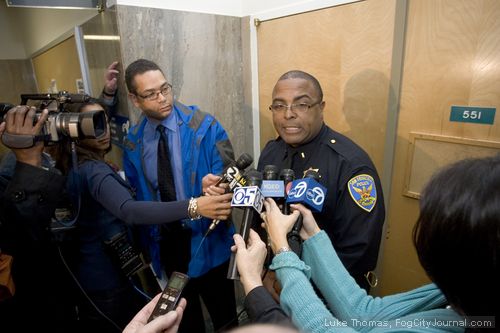
SFPD Lt. Troy Dangerfield (center) takes questions from reporters, 3/2/11, about alleged police misconduct and perjury related to warrantless searches and the filing of false police reports. Photo by Luke Thomas.
By Josh Wolf
Editor’s Note: Josh Wolf is an independent journalist and a student at the UC Berkeley Graduate School of Journalism. When Lt. Troy Dangerfield called Wolf, he asked, “Are you a student? We normally don’t deal with students.” After mentioning he was making official inquiries on behalf of Fog City Journal, Dangerfield co-operated with Wolf’s inquiry.
March 15, 2011
Following complaints from major media organizations frustrated by independent journalists covering the same news events, the San Francisco Police Department responded by revoking press passes from several online outlets.
While police policy specifically states press passes are reserved for outlets that regularly cover breaking news about fire and police events, an SFPD-issued press pass is required to access press facilities at City Hall including the press box in Board chambers.
“I was literally in shock when they were saying that I wouldn’t be able to use my press pass,” said Bill Wilson, a freelance photographer who has covered San Francisco for more than five years and recently used his press pass to cover President Barack Obama’s visit to the Bay Area and his arrival at San Francisco International Airport.
Although he hasn’t found himself unable to cover a story since the police revoked his press pass, Wilson said he decided to not cover a political event at the Port of San Francisco because he believed he would need a valid pass to gain access.
Even at City Hall, Wilson has found his press pass to be a necessity. On one occasion, when he left his press pass at home, a Sheriff’s deputy told him he couldn’t enter the media area; the deputy eventually convinced his supervisor to let Wilson in after vouching for him.
Lt. Troy Dangerfield, a police spokesman who also manages SFPD press pass issuance, said that although the police hold press conferences in a room that’s big enough to hold every interested reporter, other facilities, such as the room the mayor uses for press conferences, are much smaller. Individuals from major networks complained they were being crowded out by their independent counterparts, triggering the revocation of press passes of reporters who have not recently covered breaking news stories involving police or fire departments, said Dangerfield.
Reporting for the San Francisco Sentinel, one of several outlets now without a police-issued press pass, Pat Murphy writes that Dangerfield told him the complaints were “from, but not limited to, KGO and KTVU.”
But when reached by phone, both Kevin Keeshan, the news director for KGO television, and Tony Bonilla, the senior assignment editor for KTVU, were adamant their stations never requested the police revoke other reporter’s press passes. Both men seemed genuinely surprised by the suggestion.
When asked about the conflicting stories, Dangerfield said that all he told Murphy was the complaints came from “the major media.” He said that he cited only KGO and KTVU as examples of major media, and that he never suggested they were the specific source of the complaint.
Dangerfield would not divulge which media outlets had complained. He said they had approached him in confidence, and he would only tell me it was “major news organizations and individuals.”
When I suggested that the information should be available under the California Public Records Act, Dangerfield implied my request would likely be fruitless and compared it to requesting the identity of someone who tips off the police to a crime. In this case the crime would be abusing the police press pass, he suggested.
Dangerfield said that the passes issued by his department could potentially be abused by dishonest reporters and said that the passes can even be used to get discount tickets to Disneyland.
He said that reporters who want to have their press pass reinstated simply must begin covering fire and police events. Under State law, working journalists are allowed to cross police lines to report on fires.
Dangerfield said that this is the purpose of the police press pass, and journalists can always print their own passes to help identify themselves as reporters. He said that police-issued press passes are not designed to gain access to events at City Hall and that other city agencies are free to create their own press accreditation process.
But Dangerfield offered no evidence that the major media’s complaints had anything to do with their efforts to cover fires or other incidents involving the police. Instead, he said mainstream media complained to him that “we always have to be in the back,” a gripe far more common during scheduled press conferences than when news breaks.


 The Hunger Site
The Hunger Site
March 18, 2011 at 8:57 am
Howard,
Fog City covers ‘breaking police news’ regularly and they know that. Bottom line is that the cops should have nothing whatsoever to do with press credentials. Giving them the ‘power’ to regulate them is very unusual. Dan Noyes wrote me and said that he doesn’t have a cop pass and it has never hindered him. I stopped applying for them when the Call folded around 10 years ago and Tony De Renzo simply makes us our own with the organization’s name and I’ve never been hassled either. But, that could be because we are who we are. Any venue can refuse you admittance no matter what kind of ID you have.
The matter needs a hearing before the Board’s Public Safety Committee and hopefully there’ll be one soon.
Go Giants!
Daly’s Dive Friday’s Noon til 3pm. $2 pints and $2 fries
h.
March 15, 2011 at 3:42 pm
The Sentinel has been covering City Hall for several years. Online publications are the future. Lt. Dangerfield should be ashamed. Who’s next? Fog City?